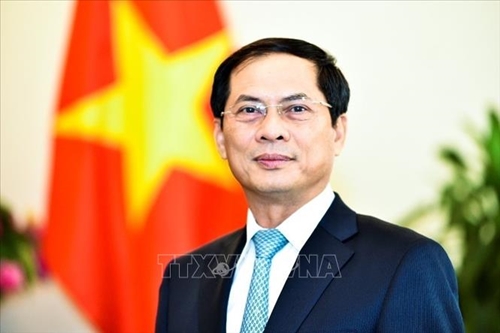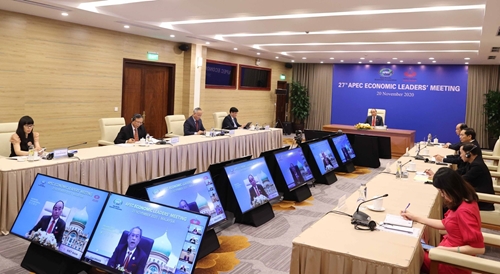Founded in 1989, APEC comprises 21 economies: Australia, Brunei, Canada, Chile, China, Hong Kong (China), Indonesia, Japan, the Republic of Korea, Malaysia, Mexico, New Zealand, Papua New Guinea, Peru, the Philippines, Russia, Singapore, Taiwan (China), Thailand, the U.S., and Vietnam.
    |
 |
|
Permanent Deputy Foreign Minister Bui Thanh Son |
In an article on the APEC Vision 2040, Son noted that the vision was adopted at the 27th APEC Economic Leaders’ Meeting on November 20, marking the starting point of a new journey of cooperation towards an open, dynamic, resilient, and peaceful Asia-Pacific community.
Amid complex and unpredictable developments in the region and the world, multilateral cooperation has become more urgent than ever. The APEC Vision 2040 has given new impetus to regional cooperation and economic connectivity while affirming APEC’s role as the leading mechanism of economic connectivity and consolidating trust in multilateralism, he said.
Only five years after its inception, at the second APEC Economic Leaders’ Meeting in Indonesia’s Bogor city in November 1994, participants approved the Bogor Goals, targeting liberalized trade and investment for developed economies by 2010 and for developing countries by 2020.
These goals became the “lodestar” for APEC activities over the last two decades, turning the forum into an increasingly cohesive market and a leading mechanism for guiding regional trade and investment liberalization, thus contributing to peace, stability, and development in the Asia-Pacific, the Deputy Minister noted.
In the APEC Vision 2040, leaders of member economies stated, “Our vision is an open, dynamic, resilient, and peaceful Asia-Pacific community by 2040, for the prosperity of all our people and future generations.”
Amid a profoundly changing world, an evolving new regional architecture, a science and technology boom, and complex developments from global challenges, this vision sends a strong message affirming that members continue to attach great importance to the Asia-Pacific and APEC, Son said.
With a commitment to maintaining APEC’s voluntary, non-binding, and consensus-building principles, leaders identified three drivers for achieving the vision: trade and investment, innovation and digitization, and strong, balanced, secure, sustainable, and inclusive growth.
These important cooperative pillars will guarantee sustainable growth in the Asia-Pacific as well as the dynamism and resilience of the APEC community, Son went on.
The Deputy Minister held that together with the Hanoi Declaration on the ASEAN Community’s Post-2025 Vision, adopted at the 37th ASEAN Summit in November, the building and implementation of the APEC Vision 2040 will continue to affirm member economies’ cooperative spirit and responsible contributions for the sake of prosperous development, peace, and stability in the Asia-Pacific over the next two decades.
In his article, the official pointed out that during the more than 20 years of its proactive, active, dynamic, and creative membership of APEC, Vietnam has left many considerable imprints on the forum’s development process.
As the host of APEC activities in 2006, Vietnam proposed the idea of an Asia-Pacific free trade area, which has been identified as one of the orientations for the region over the next 20 years.
It again asserted its foothold in the APEC cooperation process via the Da Nang Declaration adopted at the 25th APEC Economic Leaders’ Meeting in 2017. This affirmed the resolve to promote economic connectivity and initiatives on inclusive economic, financial, and social development, along with human resources development in the digital age.
Notably, Vietnam also suggested the formation of the APEC Vision Group to launch discussions on the building of a post-2020 vision, Son wrote.
Over the last three years, the country has continued making practical and outstanding contributions to this building process, he noted, adding that as deputy head of the APEC Vision Group, it worked to promote consensus during the compilation of the group’s report. It also joined other ASEAN members to propose ideas that suited the common interest to promote the role of the Asia-Pacific, centered on people and securing inclusive and sustainable development.
    |
 |
|
At the 27th APEC Economic Leaders’ Meeting on November 20 |
Vietnam’s proposals and ideas were included in the APEC Vision 2040, Son noted.
With its stature and power from nearly 35 years of reforms and over 20 years of APEC membership, he concluded, Vietnam will continue its active contributions to the implementation of the APEC Vision 2040, thereby helping realize shared visions and aspirations and turning them into “fruits of peace, stability, and happiness for all our people” as Prime Minister Nguyen Xuan Phuc said at the 27th APEC Economic Leaders’ Meeting.
Source: VNA